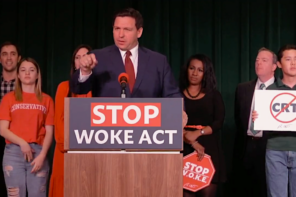While most Religion Dispatches readers are familiar with the growing influence of Christian Zionists and their close relationship with Israel, few are probably aware of the penetration of American evangelicals into Northern Iraq.
Shortly after the invasion of Iraq, a number of fundamentalist Christian organizations announced plans to participate in the future rebuilding effort. At the time, the Rev. Franklin Graham indicated that his organization, Samaritan’s Purse, would lead the way.
Graham, the son of the Rev. Billy Graham, who shortly after September 11, got himself into a bit of a pickle by lashing out at all Muslims, famously calling Islam “a very evil and wicked religion,” was now poised—with US troops about to march into Baghdad—to organize welcome wagons stuffed with Bibles and bandages.
Around that time, while working on Bad Faith—a yet-to-be-completed book focusing on the financial forces behind the religious right—Mike Reynolds* got wind of the Nashville, Tennessee-based America 21, a nonprofit political action committee that hopes to bring America to God by encouraging “moral leadership from our churches” to be heard “in the halls of Congress and across this nation.”
According to Reynolds, an investigative reporter whose work on the religious right has been featured in Rolling Stone, US News & World Report, and 60 Minutes, “the group caught my eye because it was involved with holding support rallies for Judge Roy Moore, who, as chief justice of the Alabama Supreme Court defied a federal order to remove his 5,300-pound monument of the Ten Commandments from inside the state’s judicial building.” The statue was later removed from the building and Moore was removed from the bench.
“Later,” said Reynolds, “I discovered that America 21 was involved with former Texas Congressman Tom Delay and the Republican Party’s uber-lobbyist Jack Abramoff.”
According to Reynolds, America 21 “was run by an old anti-abortion ambulance-chasing lawyer and lobbyist named J Thomas Smith… [who] was working on behalf of some Christian evangelicals that were looking to set up shop in Kurdistan.” Those discoveries led him to Douglas and Marilyn Layton and Servant Group International, a project run out of the Belmont Church in Nashville.
While Franklin Graham was preparing to provide relief to beleaguered Iraqis (and to find Christian converts), Servant Group International had already been in Iraq for more than ten years. Again, Reynolds:
In September 2003, four months after US forces defeated Saddam Hussein, 350 evangelical pastors and church leaders assembled in Kirkuk, welcomed by Kurdistan Regional Government President Massoud Barzani. During the gathering, George Grant, the American director of the Classical School of The Medes, declared that ‘Jesus Christ is Lord over all things; He is Lord over every Mullah, every Ayatollah, every Imam, and every Mahdi pretender; He is Lord over the whole of the earth, even Iraq!’
In a recent interview, Reynolds discussed the curiously strong presence that Christian evangelicals have established in Northern Iraq:
How did Christian evangelicals get so deeply involved with the Kurds?
You might say that it started after Saddam Hussein’s 1988 assault on the Kurds, which culminated in the chemical weapon attack that killed thousands in the village of Halabja. Some 14,000 refugees from Kurdistan made their way to Nashville, Tennessee, now home to the largest Kurdish population in the nation. Four years later, a group of Nashville evangelical Dominionists known as Servant Group International, departed from the Belmont Church—a megachurch occupying several blocks on Music Square—making their way to the mountains of northern Iraq where they set up shop.
Why is Kurdistan important to Christian evangelicals?
For evangelicals, Northern Iraq is prime real estate in what they call the “10/40 Window,” which is a geographical delineation at 10 and 40 degrees North latitude that opens across North Africa, through the Middle East, India and closes in Indonesia. The concept originated in 1991 with Argentine evangelist Luis Bush, and was expanded upon by his fellow New Apostolics C. Peter Wagner and George Otis Jr. These zealous dominionists called it the “primary spiritual battleground in the world today…the Church’s final evangelistic frontier.”
When the “spiritual warriors” of Servant Group International headed out of Nashville for Kurdistan it was under this banner. With the compliance of the Barzani-led KRG and a sympathetic Bush Administration, these US evangelicals have established a solid base of operations in the Middle East for their aggressive and potentially inflammable brand of proselytizing. With tensions ratcheting up between the Kurds and Iraqi Sunnis over who will control the oil-rich regions of Kirkuk and the Nineveh plain, having these American end-time evangelicals trying to convert Muslims in Kurdistan with the blessings of the KRG is, as a longtime Kurdistan expert told me, “like striking matches in a room full of gasoline.”
What was Servant Group International up to?
The folks from Belmont Church had a very big agenda. They brought with them Kurdish-language Bibles, medical equipment, lots of money, and a long-range plan to establish their “Father’s Kingdom” between the Turkish border and Iran. Since the time of its arrival in Northern Iraq, Servant Group International has widened its presence, establishing bases in Turkey, Liberia, Indonesia, Germany, and Norway.
Can you describe how Servant Group International operates?
What is especially distinctive about SGI—and its partners—is its development of a military model of evangelism (‘spiritual warfare’), which includes covert action tactics (‘tentmaking’), intelligence gathering (‘spiritual mapping’). They have an ingrained animosity to Islam, and their Dominionist ‘Kingdom Now’ worldview, is a fusion of neo-Calvinist authoritarianism and ‘New Apostolic’ Pentecostalism, a cult-like millenarian sect of the Assemblies of God led by self-anointed ‘apostles’ and ‘prophets.’ Interestingly enough, its best-known adherent is Republican vice presidential candidate Sarah Palin.
The movement, marked by its obsession with demons and world conquest, grew under the guidance of C. Peter Wagner, head of an outfit called Global Harvest Ministries. In the November 2005 Global Harvest newsletter, Wagner wrote that “God has already raised up for us a key apostle in one of the strategic nations of the Middle East, and other apostles are already coming on board. Once we have the apostles in place, we will then bring the intercessors and the prophets into the inner circle, and we will end up with the spiritual core we need to move ahead for retaking the dominion that is rightfully ours.” Despite such theocratic baggage, SGI shrewdly established themselves as valued assets to the KRG ruling families and the Bush/Cheney Iraq war effort.
In her groundbreaking 1989 book Spiritual Warfare: The Politics of the Christian Right, Sara Diamond defines the term as “A form of intense prayer—often accompanied by ‘charismatic’ practices such as speaking in tongues—intended to change either a material or supernatural situation.” Can you explain the role that ‘spiritual warfare,’ plays with SGI?
In their 2000 book, Our Father’s Kingdom: The Church and The Nation, Douglas Layton, and co-author George Otis Jr. declared that “if communists and Muslims can take nations—so can our God!” And by ‘taking nations,’ Layton means that “Christ’s kingdom must rule over government and law, the arts and sports, education, business, economics, science and technology, the media, and the family.”
Otis, one of the generals in the Spiritual Warfare movement, heads The Sentinel Group, formerly known as Issachar Frontier Missions Strategies. Sentinel is essentially a global evangelical intelligence agency that deploys “field cells” with laptops who gather demographics in cities and rural areas in targeted countries. The data is then forwarded to computer banks at the Sentinel Group as part of its “spiritual mapping” project. It is currently operational in Central America, Uganda and the Middle East. Otis’ history in Middle East dates back more than two decades to when his father George Otis Sr., a close friend of Ronald Reagan and former Lear Jet executive, set up the High Adventure radio ministry in Lebanon in 1980. Otis put the station in the hands of Christian Falangists during the Israeli occupation. The US State Department tried to shut him down without success.
Otis then launched Middle East Television, an evangelical broadcaster also in Lebanon. Otis later “gifted” MET to Pat Robertson who absorbed the station into his global Christian Broadcasting Network. At a New Orleans conference of evangelicals in 1987, one of George Jr.’s Issachar associates told Sara Diamond that their group intended to make themselves more attractive to recruiters from CIA and State by working as ‘bi-vocational’ professional missionaries—like teachers, businessmen, consultants, engineers, diplomats, and military personnel.
Douglas Layton is clearly an important figure in all this. Talk more about him.
Douglas Layton, the founding director of Servant Group International, is a veteran evangelical missionary to the Middle East. More than seven years ago, in a publication called The Forerunner, longtime Christian Reconstructionist Andrew Sandlin wrote of Layton and SGI’s evangelical push into northern Iraq: “If we are going to support missionaries, let’s support missionaries who are going around the world to recapture cultures, not simply win a few souls here and there,” Sandlin wrote. “For example, consider Doug Layton in Kurdistan, northern Iraq, who is rebuilding a Christian culture: new Christian schools, new Christian businesses, and more. He is not content to build churches; he wants an entire Christian culture.”
Up until this year Layton served as the Erbil director of the Kurdistan Development Corporation, a KRG sponsored venture launched in 2004 to promote, facilitate and establish business and investment opportunities in the Kurdistan Region in Iraq. Layton transitioned from his post at the KRG Ministry of Health where he wrote speeches for the minister and directed the USAID-backed boondoggle, Health Care Partnerships in Northern Iraq.
The last I heard, Layton was operating a private venture called The Other Iraq Tours that arranges junkets for American businessmen and politicians into Kurdistan.
What is SGI up to now, five-plus years after the US invasion?
These days, SGI is closely involved with the Kurdistan Regional Government, the ruling coalition of Massoud Barzani’s Kurdish Democratic Party (KDP), and Jalal Talabani’s Patriotic Union of Kurdistan (PUK), brokering international business concessions and oil drilling contracts, funneling USAID money into their missions, setting up a chain of ‘classical Christian’ schools and producing slick PR videos for the Kurdistan Regional Government that were broadcast in the United States. It appears as if the KRG has given them the run of the country, often backing their ministries and schools with grants of land, buildings and other favors.
* * *
*Disclosure: Earlier this year, Reynolds and I worked together on a project investigating the right-wing money behind the attacks on Barack Obama. Our work resulted in the publication of “The Palin Payoff: How Sarah Brings in the Christian Cash.”




